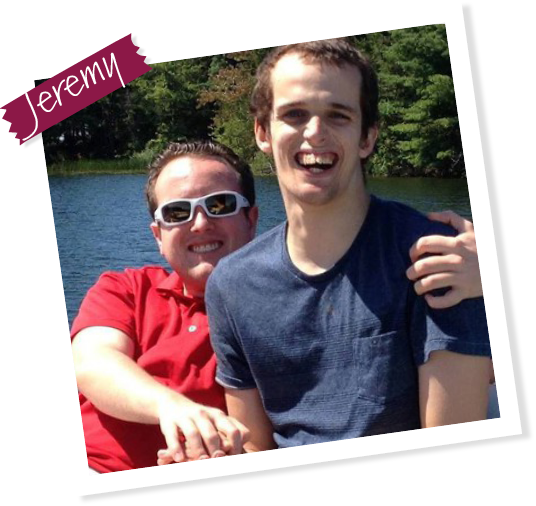Jeremy Roberts, MPP Ottawa West-Nepean, caring for his brother
 I serve as a Member of Ontario Provincial Parliament for the riding of Ottawa West-Nepean. My journey into politics started with my younger brother Dillon who, alongside loving potato chips, swimming, and Barney the Dinosaur, is also non-verbal autistic with a developmental delay and epilepsy. Not being aware of the term “caregiver” when I was younger, I would usually call myself “the third parent”, as taking care of my brother was more than a two-person job. As early as I can recall, I remember thinking I couldn’t be a burden to my parents; I had to support them with my brother, which included helping him eat, drink, going to the bathroom, getting dressed and most of his other daily functions. Initially this was our normal and although it was very difficult to deal with, we managed.
I serve as a Member of Ontario Provincial Parliament for the riding of Ottawa West-Nepean. My journey into politics started with my younger brother Dillon who, alongside loving potato chips, swimming, and Barney the Dinosaur, is also non-verbal autistic with a developmental delay and epilepsy. Not being aware of the term “caregiver” when I was younger, I would usually call myself “the third parent”, as taking care of my brother was more than a two-person job. As early as I can recall, I remember thinking I couldn’t be a burden to my parents; I had to support them with my brother, which included helping him eat, drink, going to the bathroom, getting dressed and most of his other daily functions. Initially this was our normal and although it was very difficult to deal with, we managed.
Things got unmanageable during my brother’s teen years. My brother’s seizures became more regular, and he developed behavioural issues and severe aggression. During those years, one of us always had to be in the room with Dillon to make sure he was okay. My mother had to leave her job due to the amount of time off she was taking to care for my brother and my father was also taking significant time off work as well. I was staying home from high school weeks on end to help with Dylan. This was our crisis point. My mother and father were trying to care for my brother while dealing with the mental health implications of caregiving. The strain it was putting on the family unit was too overwhelming and unsustainable. It was awful to see my brother in such pain and not be able to communicate what he feeling. It would affect us all because he was usually such a cheerful guy. His laughs would get a whole room laughing because it was so pure and infectious.
One night, I was studying, and my brother was having a tantrum in his room. All of a sudden, I saw he had kicked a hole through his wall into my room. That was my tipping point when I said a family cannot keep functioning like this. That night, although my parents were reluctant at first, we took Dillon to the children’s hospital in Ottawa. They told us my brother had to be put in a care home that could give him the support he needed. The process of getting my brother into this home is what sparked my interest in politics. The price tag for a residential placement was $85,000 per year – a cost we could never afford. We lobbied the government and I presented before a social services board in Ottawa. Through this advocacy, we were able to get the necessary funding from the government to get Dillon into a wonderful home.
I still consider myself a caregiver for my brother and prior to COVID, I would see him a few times a week, including for dinner every Sunday. There were difficult times caring for my brother, but at the end of the day the experience made me into who I am today. I am grateful that I stood up that night and convinced my family to take him to the hospital so that he could get the help he needs. My parents might have soldiered on if I didn’t step in, but it wouldn’t have been healthy for them or my brother in the long run.
To any new caregiver, I would say: don’t be afraid to reach out to friends and family to ask for help. I know most young caregivers don’t speak to their friends about their situation because being a young caregiver is not the norm, but my friends helped me get through it when I spoke to them. Ask for help from the system as well. There are many people that say it’s too complicated to navigate but with some advocacy, you can really get the support your loved one needs.
Finally, I would like to say that once you are past the crisis point, get involved in advocacy in any capacity. The more people that hear our stories and the more people with our lived experience who get elected, the more likely it is that we can get the change we need.
